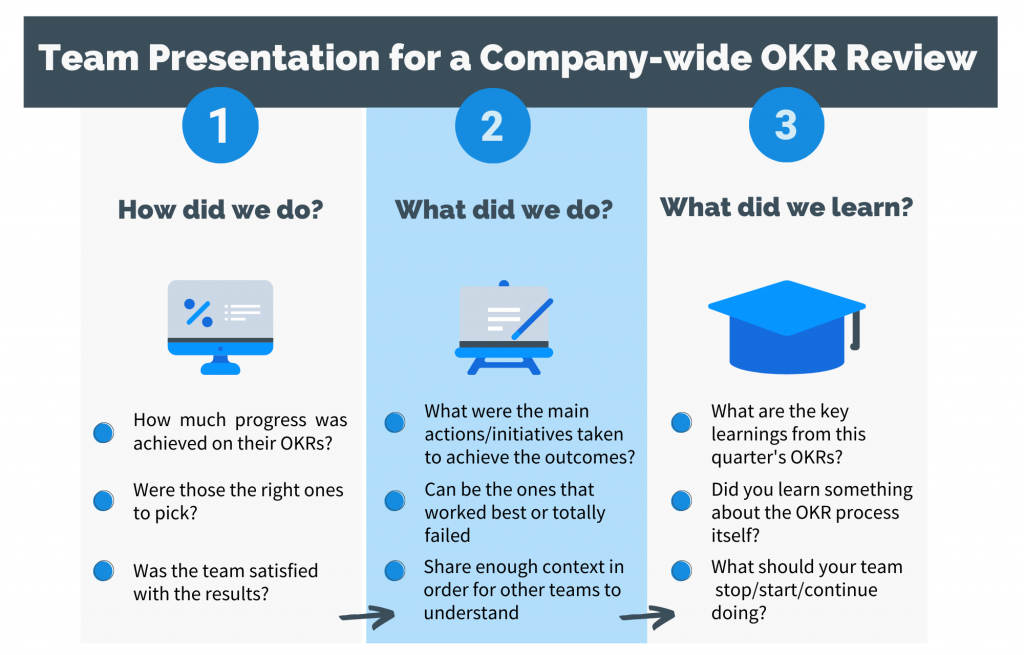When you start setting goals using OKR methodology, you should see improvement and progress as a company or a team. But succeeding with OKRs doesn’t equate with the achieved percentage of the Objective. Even if you achieved 100% of your Objectives it might still mean it was quite random, the bar was too low or you just got lucky.
Without understanding what brings success and what brings chaos, it’s hard to actually improve. OKR success is also about gaining knowledge, having innovation and making discoveries. Sometimes the OKR with only 20% of progress might be your best one ever.
So how do you conduct a company-wide review and evaluate the OKR process to gain knowledge? We will look at the process for a company wide quarterly review, as well as what mindset your company needs and the best questions to ask.
“The ability to learn faster than your competitors may be the only sustainable competitive advantage”
Arie De Geus
While this article is focused on companies setting goals with OKRs, it could, in theory, be useful to any company wanting to review their quarter. You just may be missing the goal alignment and metrics that Objectives and Key Results provide.
Review OKR progress easily with OKR Tool
Dedicated OKR Software simplifies the review process by giving you a full overview of OKR progress in detailed dashboards.
The OKR Quarterly Review Process
The end of the quarter review should also happen in the correct order. It even seems impossible to share findings on a company level if the teams haven’t analyzed what to share yet.
For teams, the process of a monthly review or preparing for a company-wide review is the same. The process itself is rather simple, just remember to
1) have an open and honest but respectful culture,
2) share constructive feedback,
3) ask the right questions, and
4) have valuable discussions to complement the answers.
1. Conducting team OKR reviews
The company-wide review should always start with teams reviewing and analyzing their OKRs and work done. If you are just conducting a review on the team level, you can still follow the same process. Teams can use the questions below to understand what were the most valuable lessons learned.
To give everyone time to think and analyze it would be best if people get the questions beforehand and come to the review meeting already prepared.
The review meeting should have two outputs:
1) a longer report of team learnings, ideas, etc. This is for the team, providing more detailed information about learnings
2) A concise overview to present to others in the company. This is for a company-wide review, since you don’t have time to share a long report. Use the Weekdone TV Dashboard
2. Prepare for your company-wide presentation
If the next step will be a company-wide (or department) review, then teams should keep in mind that everything presented should be understandable for other teams. That means, if you are talking about some kind of action that helped to achieve a lot of progress on your Key Results, be ready to explain and offer more context in order for others to understand.
It may not be so easy for Marketing to understand how Sales works and what different terms mean, etc. If people do not understand the context, it’s hard to make sure that they will learn anything from your experience.
Think about the presentation as telling a story – before getting to the main point there’s an introduction to give enough background which makes understanding the main point possible.
Before sharing the lessons learned, the team should also make an overview of their progress made and most important steps taken to achieve those results.
In summary, each team should be ready to talk about 3 main points during the company-wide review:

Helpful Questions to Prepare
- How did the team do? How much progress did the team achieve on their Objectives and Key Results? Were those the right ones to pick? Besides telling how much was achieved percentage-wise, also explain if the team is satisfied with the results.
- What were the main actions/initiatives taken to achieve the outcomes? Introduce a couple of the most relevant ones. Those can be the ones that worked best or completely failed.
- What are the key learnings from this quarter’s OKRs? Share 3-6 main takeaways. Did you learn something about the OKR process itself? What should the team stop/start/continue doing?
3. Conduct the quarterly review “presentations”
After teams have finished with their summaries, it’s time to organize a company-wide event where each team can present what they have prepared. Leave time for other teams to ask questions and share their ideas/feedback as well.
After the presentations discuss together how everyone felt about the Company Objectives. Was this focus right? Did teams see company-wide improvements?
At the end of the review session, it would be good for the CEO or Management to have a little summary speech. It should be about acknowledging the hard work done by the teams and repeating the most important lessons learned which caught their attention the most.
If Management already has ideas for next quarter’s Company Objectives then it would be a good time to share them as well.
Note for larger companies
If your company also has departments and it would be a very long day to hear each team present their reports, then organizing a department review would be relevant.
The goal of the department review would be to hear each team presentation, have a discussion, and make an overview which can be presented during the company-wide review. The points presented are similar to what the teams did, it would be just a summary of teams presentations:
- What did the department do? How much progress in general did teams have with their OKRs? Were they satisfied with the OKRs set? Give a brief overview of the teams in general.
- What were the main actions/initiatives taken to achieve the outcomes? Introduce the most impactful and biggest ones, and the ones that failed but helped you learn a lot.
- What are the key learnings from the OKRs? Share up to 10 main takeaways from different teams.
Going through the process of the OKR quarterly review is the first step. However, there are some other aspects you must keep in mind to make sure your quarterly review is successful.
Cultivate the Right Mindset for the Review
1. You learn only if you are ready to learn

2. There’s a huge difference between criticism and constructive feedback
Plain criticism is not welcomed but constructive feedback needs to be given and it needs to be accepted by the receivers. It’s not about who’s idea is best but which idea is the best for the company or team’s progress.
People have to be able to admit that “well, I thought this would work but it didn’t”. That’s fine! You just need to try something else and it’s important to stop when something isn’t working. And as T.Edison said “I’ve not failed. I’ve just found 10,000 ways that do not work”.
Finding things that do not work for your company is also progress if you understand why they didn’t. It’s gained knowledge!
3. Opinion or feedback doesn’t follow the power hierarchy
Opinion is a point of view which is generated based on the role we are in which defines the angle we see it from and what kind of past experiences and knowledge we have to analyze the situation. The power hierarchy just changes from which angle the situation is experienced but not the value of the opinion. Same goes with feedback.
Each feedback and opinion is valuable if it’s backed up with facts and can be explained. People need to feel safe to share their opinions and honest feedback. That means their answer can’t be later rejected based just on their position or even worse their job can’t be threatened if they say honest things that maybe managers do not want to hear. To learn, we need to be ready to accept the feedback no matter where it is coming from.
More Guiding Questions + Free Download
It’s hard to evaluate anything if you do not know what you are supposed to look for. If you ask the right questions, that direct people’s thinking in the right direction, you might learn many interesting things. We will give you some questions for different purposes, you can find them below. You do not need to answer them all, choose what is relevant for you and what clicks in your people’s minds.
Keep in mind that answers need to be discussed! When we say it out loud, it requires us to think our sentences through and formulate the answer that we are planning to give. Already in this process we actually evaluate and analyse a lot more than when it happens just in our head.
Discussion is important because we all evaluate the same situation from different angles based on the knowledge and experience that each individual has. More opinions means that we are able to get a deeper and fuller understanding. By discussing our points of view we can connect the dots between different things and make conclusions why something has happened or what might influence it.
Remember, it’s constructive feedback and not just judging people’s opinions. In the end of the discussion the group should agree on common learning points.
1. How did the team generally perform? What did we achieve?
2. How was the quality of the OKRs that were set? Did they help the team make some improvements?
3. Did we prioritize the OKRs enough? Were people working on them?
4. Were people aware of the roles and responsibilities they had? Did they feel that they knew what to do?
5. How often did we discuss the progress? Did we have enough regularity and consistency?
6. How can we be better with setting OKRs next quarter? What do we have to keep in mind?
1. Why were we successful with achieving the Objectives?
Was it intentional or did it just happen?
2. What kind of actions brought the highest results?
3. Are there things that we can improve even more?
4. Can we use what helped us succeed in some other areas as well?
5. What are the key takeaways from our success that we can share with others?
1. If we failed, then why? What did we try and why do we think it didn’t work?
2. Most likely something fell short. If it wasn’t a Key Result, it was some kind of action that didn’t bring results. So, what doesn’t work for our team/company?
3. What were the major challenges?
4. Why did those major challenges appear? Can we prevent them in the future? How?
5. What kind of knowledge or experience might we be missing? How can we gain it or did we already?
1. What are the key things we learned and have to keep in mind while making decisions in the future?
2. What kind of new opportunities have we noticed?
3. What should we as a company or a team start doing? Or what should we continue doing?
4. What should we stop doing?
As a summary, remember to have an open and honest but respectful culture, share constructive feedback, ask the right questions, and have valuable discussions to complement the answers.